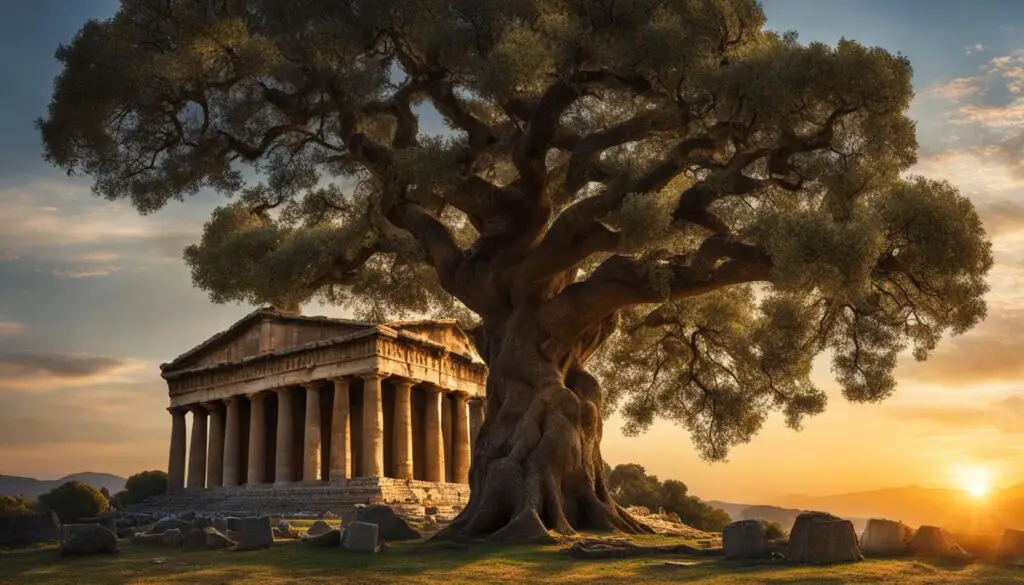Oak trees have long held significant symbolic meaning in cultures throughout history, representing a myriad of qualities and concepts. From wisdom and protection to strength and prosperity, these majestic trees have captured the imagination and reverence of people worldwide. In this article, we will explore the profound symbolism of oak trees in various cultures, shedding light on their rich and deep-rooted significance.
Key Takeaways:
- Oak trees symbolize wisdom, longevity, and protection.
- They are associated with strength, courage, and divine power.
- Oak trees represent prosperity, fertility, and interconnectedness.
- They hold sacredness in Celtic culture and Norse mythology.
- Native American traditions view oak trees as symbols of strength and interconnectedness with nature.
Oak Tree Symbolism in Norse Mythology: The Mighty Norse Yggdrasil
In Norse mythology, the oak tree holds great symbolic significance, particularly through its association with the mighty Norse Yggdrasil, the cosmic world tree. Yggdrasil stands as a testament to the oak tree’s symbolic prowess and its deep-rooted connection to Norse culture.
Yggdrasil is believed to be the center of the Norse cosmos, connecting nine realms that encompass gods, humans, and various creatures. It serves as a symbol of interconnectedness and stability, with its branches extending over vast lands, providing shelter and support to all beings.
The oak tree’s association with Yggdrasil reflects its inherent qualities of strength, endurance, and support. Just as the oak tree’s sturdy trunk and far-reaching branches provide stability to the world tree, it represents the stability and interconnectedness of the Norse cosmos.
This image depicts the grandeur of Yggdrasil and its intertwined branches, symbolizing the interconnectedness of all realms within Norse mythology. The oak tree’s presence within this cosmic tree highlights its integral role in Norse culture and the profound symbolism it carries.
Throughout Norse mythology, the oak tree is revered for its enduring strength and its ability to serve as a steadfast support system. It exemplifies the resilience required to navigate the vast and sometimes treacherous landscapes of the Norse cosmos.
As we delve into the rich symbolism of the oak tree in Norse mythology, we gain a deeper understanding of its significance and the profound interconnectedness it embodies.
The Sacredness of Oak Trees in Celtic Culture
In Celtic culture, the oak tree holds a special place of reverence and is considered sacred. It carries deep symbolism that reflects the values and beliefs of the Celts, including strength, longevity, and wisdom. The oak tree’s association with these qualities makes it an important symbol in Celtic folklore and traditions.
One of the most prominent aspects of oak tree symbolism in Celtic culture is its link to strength and endurance. The oak tree’s robust and sturdy nature is seen as a representation of inner strength and resilience. It is admired for its ability to withstand harsh conditions and still thrive, a trait that resonates with the Celtic spirit.
The sacred Celtic oak tree is a symbol of endurance and resilience, serving as a guiding force for personal growth and transformation.
Furthermore, the oak tree is often associated with longevity and wisdom in Celtic culture. Its long lifespan and deep-rooted nature are seen as a reflection of wisdom acquired over time. The Celts believed that oak trees were inhabited by spirits and held divine knowledge, making them a source of guidance and wisdom.
Druidic rituals and ceremonies were often conducted in the presence of oak trees. These ancient Celtic priests, known as druids, believed that oak trees were a gateway to the spiritual realm. They saw the sacredness of oak trees as a means to connect with the divine and seek insight and guidance.
The sacred Celtic oak tree serves as a reminder of the enduring strength that lies within each individual. It symbolizes the ability to navigate through challenges and emerge wiser and stronger. The oak tree’s association with strength and endurance makes it an inspiring symbol for personal growth and transformation.
Symbolism of Oak Trees in Celtic Culture
| Symbol | Meaning |
|---|---|
| Strength | The oak tree represents inner strength and resilience. |
| Longevity | The oak tree’s long lifespan symbolizes wisdom acquired over time. |
| Wisdom | Considered a source of divine knowledge and a symbol of wisdom. |
Oak Tree Symbolism in Ancient Greek Culture
In ancient Greek culture, the oak tree held great significance and was closely associated with Zeus, the king of the gods. It symbolized strength, wisdom, and protection, embodying the divine qualities that Zeus represented.
According to Greek mythology, Zeus was believed to manifest himself in the form of an oak tree to communicate with mortals and exert his divine power. The oak tree became a sacred symbol of his presence and authority. Many sacred sites dedicated to Zeus were located near or within groves of oak trees, further emphasizing their connection.
The association between the oak tree and Zeus highlights the enduring strength and power that the tree represents. Just as the oak tree stands tall and sturdy, so too does Zeus stand as a pillar of strength and wisdom in Greek mythology.

Oak Trees in Native American Traditions
Ancient Native American tribes held a deep reverence for oak trees, seeing them as sacred beings that symbolized strength, resilience, and interconnectedness with nature. For Native Americans, oak trees were not only towering giants but also wise teachers, revealing the essential interdependence between all living beings.
Strong as the oak
“The oak teaches us about the strength that resides within us. Just as its roots run deep into the earth, anchoring it firmly, we too can find strength within ourselves to endure the challenges that come our way. The oak imparts the wisdom that we are part of a greater web of life, interconnected with all of nature.”
The acorns of abundance
The acorns produced by oak trees also hold symbolic importance in Native American traditions. They represent abundance, nourishment, and fertility. Native Americans recognized the value of acorns, not only as a food source but also as a symbol of the abundance and sustenance that nature provides.
Throughout history, Native American tribes have utilized oak trees for practical purposes as well. The wood was used to build shelters, create tools and weapons, and fuel fires for warmth and cooking. Oak bark was treasured for its medicinal properties and used to treat various ailments and injuries.
The image above captures the essence of oak tree symbolism in Native American traditions. The mighty oak stands tall and proud, its branches reaching out in all directions, symbolizing strength and resilience. The interconnectedness with nature is depicted through the lush greenery and the natural beauty of the surrounding landscape.
Native American traditions continue to honor and respect oak trees for their profound symbolism. The wisdom and teachings of these majestic beings remind us of our own inner strength and the importance of living in harmony with our natural surroundings.
Oak Tree Symbolism in Chinese Culture
Oak trees hold deep cultural significance in Chinese culture, symbolizing strength, longevity, and resilience. They are associated with protecting the natural world from evil spirits and negative energies. Traditional Chinese Medicine recognizes the healing properties of various parts of the oak tree. The oak tree’s representation of strength and healing contribute to its symbolism in Chinese culture.

Oak Trees in European Folklore and Traditions
Oak trees hold a special place in European folklore and traditions, symbolizing strength, endurance, and the power of nature. Throughout history, oak trees have been associated with sacred rituals and festivals, becoming an enduring emblem of power in European cultures.
The ancient Celtic priesthood known as Druids held sacred rituals in oak groves, considering these trees as a connection to the spiritual realm. These rituals involved chanting, dancing, and offerings to honor the tree’s symbol of strength and wisdom.
Furthermore, festivals celebrating the energy and power of oak trees were common throughout Europe. These festivals acted as a tribute to the tree’s symbol of endurance and prosperity. Communities would gather under oak trees, reveling in their presence and celebrating the harvest season.
| Symbolism | Description |
|---|---|
| Sacred Rituals | Oak trees were revered as sacred during rituals conducted by Druids. |
| Festivals | Communities celebrated oak trees and their symbolism during festivals. |
| Strength | Oak trees symbolized strength and endurance in European folklore. |
| Endurance | The enduring presence of oak trees resonates with their symbolism in European traditions. |
The Symbolism of the Oak Moon in Celtic Beliefs
In Celtic beliefs, the Oak Moon holds great significance, representing strength, endurance, and the manifestation of goals. This sacred lunar phase symbolizes the energy of assuredness, love, and care for one’s aspirations. Just as the mighty oak tree stands tall and unwavering, the Oak Moon provides the strength to open doors of opportunity and utilize them to bring fulfillment, purpose, and creative pleasure.
During the Oak Moon, the powerful symbolism of the oak tree intertwines with the lunar energy, creating a potent force for growth and manifestation. Celtic traditions view the oak tree as a symbol of strength and resilience, rooted deep in the earth while reaching for the heavens. As the moon waxes and wanes during this phase, it mirrors the cyclical nature of life and the oak’s connection to the cycles of nature.
The Oak Moon invites individuals to draw upon their inner strength, aligning with the oak tree’s unwavering attributes. It encourages the pursuit of dreams and the endurance needed to overcome obstacles. With the energy of manifestation permeating the air, the Oak Moon serves as a reminder to set intentions, visualize desired outcomes, and take inspired action toward achieving them.
The Oak Moon symbolizes:
- Strength and endurance
- Manifestation of goals
- Resilience and determination
- Wisdom and grounding energy

As the Oak Moon illuminates the night sky, it imbues individuals with the power to manifest their dreams and harness their inner strength. By aligning with the symbolism of the oak tree and embracing the energy of this lunar phase, one can tap into their potential and make significant strides towards personal growth and transformation.
Healing and Medicinal Properties of Oak Trees
Oak trees have been recognized for their healing properties and have been utilized in traditional medicine for centuries. Various parts of the oak tree, including the bark, leaves, acorns, and roots, hold medicinal value and offer a range of therapeutic benefits.
The healing properties of oak trees extend to the treatment of various ailments. Here are some of the medicinal uses in traditional medicine:
- Diarrhea: Oak bark has astringent properties that can help alleviate diarrhea.
- Dysentery: The tannins present in oak bark have anti-inflammatory and antimicrobial effects, which can aid in the treatment of dysentery.
- Hemorrhoids: Oak bark can be used topically to reduce swelling and relieve discomfort caused by hemorrhoids.
- Inflamed Gums: Chewing on oak leaves or using an oak bark mouthwash can help soothe inflamed gums and promote oral health.
- Wounds: Oak bark poultices can be applied to wounds to help speed up the healing process.
- Eczema: Oak bark extracts are often included in skincare products for their anti-inflammatory properties, making them beneficial for individuals with eczema.
The tannin found in oak trees possesses astringent properties, which can also be used to reduce minor blistering. Additionally, oak leaves have been used in American folk medicine to treat frostbite.

The Magickal Properties of Oak Trees
Oak trees possess a myriad of magickal properties that have captivated human imagination for centuries. They are revered for their association with good fortune, protection, and abundance. Furthermore, oak trees hold symbolic meaning in dreams, signifying longevity, wealth, and prosperity. In folklore and traditional beliefs, various rituals and practices involving oak trees are believed to bring luck and enhance personal power.
One of the most intriguing aspects of oak tree symbolism is its connection to dream interpretation. Dreaming of resting under an oak tree is said to portend a long life filled with wealth and success. The dream serves as a subconscious affirmation of one’s aspirations and desires, encouraging the dreamer to keep pursuing their goals with resilience and determination.
In addition to dream symbolism, the act of catching a falling oak leaf is believed to bring protection against colds and illnesses. This act is steeped in the belief that the oak leaf possesses inherent medicinal properties that ward off illness and restore health. Carrying an acorn is also considered auspicious as it is believed to bring good luck, increase fertility, and enhance sexual potency.
The magickal properties of oak trees have permeated folklore, mythologies, and cultural practices throughout history. Its association with good luck, protection, and dream symbolism showcases the deep-rooted significance and universal appeal of oak trees across different cultures and time periods.
Mythological and Folklore References to Oak Trees
Oak trees have played significant roles in various mythologies and folklore throughout history. These majestic trees have been associated with gods and heroes, adding to their mythical allure and symbolic importance. Let’s explore some of the intriguing mythological references to oak trees and their associations with legendary figures.
Greek Mythology: Zeus and the Oak Tree
In Greek mythology, oak trees are closely linked to Zeus, the king of the gods. According to legend, Zeus sought refuge in an oak tree during his childhood, highlighting the tree’s protective qualities and divine connection. The oak’s strength and endurance exemplify Zeus’s power and authority.
Norse Mythology: Thor and the Oak Tree
In Norse mythology, oak trees hold special significance and are often associated with Thor, the god of thunder. Thor is believed to have favored oak trees and used them as a symbol of strength and protection. The oak’s sturdy trunk and branches mirror Thor’s might, making it a powerful symbol in Norse mythology.
“The oak tree, a steadfast companion to gods and heroes, imbues these mythological tales with an air of strength and resilience.”
Heroic Legends and Sacrifice
Oak trees frequently appear in ancient heroic tales, symbolizing courage and sacrifice. Heroes seeking guidance or divine intervention often find solace under the shelter of mighty oak trees. These trees become symbolic markers of bravery and hope, inspiring countless generations with their enduring presence.
The mythological and folklore references to oak trees demonstrate their universal appeal and timeless symbolism. Associated with gods, heroes, and courageous acts, these trees remind us of our collective cultural heritage and the power of nature’s divine connection.
| Mythology | Associated Figures | Symbolic Meaning |
|---|---|---|
| Greek Mythology | Zeus | Protection, divine power |
| Norse Mythology | Thor | Strength, protection |
| Ancient Heroic Legends | Various heroes | Courage, sacrifice |
Conclusion
In conclusion, oak trees hold immense significance and universal symbolism in various cultures throughout history. They are revered and respected for embodying qualities such as strength, wisdom, protection, and interconnectedness. The oak tree’s symbolism transcends time and borders, reminding us of our deep connection to nature and our shared heritage.
From Norse mythology’s mighty Yggdrasil to the sacred Celtic oak tree, from the association with Zeus in ancient Greek culture to its role in Native American traditions, and the recognition of its healing properties in Chinese culture, oak trees have left an indelible mark on human beliefs and traditions.
The enduring power and timeless appeal of oak trees are evident in their presence in mythologies, folklore, and cultural practices. They serve as a powerful reminder of our connection to the natural world and our capacity for courage, resilience, and growth. The oak tree’s symbolism is a testament to its enduring significance, both in our collective consciousness and the physical landscapes that they grace.
FAQ
What do oak trees symbolize?
Oak trees symbolize wisdom, longevity, protection, strength, courage, divine protection, nourishment, medicine, endurance, grounding energy, ancestral connections, perseverance, resilience, prosperity, abundance, fertility, interconnectedness, stability, and divine power.
What is the symbolic significance of oak trees in different cultures?
Oak trees hold deep cultural significance in various cultures. In Norse mythology, the oak tree represents interconnectedness and stability as seen in the cosmic world tree Yggdrasil. In Celtic culture, the oak tree symbolizes strength, longevity, and wisdom and is associated with sacredness. In ancient Greek culture, oak trees symbolize strength, wisdom, and divine protection. In Native American traditions, oak trees represent strength, resilience, and interconnectedness with nature. In Chinese culture, oak trees symbolize strength, longevity, and resilience and are associated with protecting the natural world. Oak trees also have significant symbolism in European folklore and traditions.
What is the cultural significance of oak trees?
Oak trees hold deep cultural significance in various cultures around the world. They symbolize strength, wisdom, protection, and interconnectedness. Oak trees are associated with sacred rituals, festivals, and mythological beliefs. They represent the enduring power of nature and our collective heritage.
What is the symbolic significance of oak trees in literature and mythology?
Oak trees have played significant roles in various mythologies and folklore. They are often associated with gods, such as Zeus in ancient Greek mythology and Thor in Norse mythology. Oak trees symbolize strength, wisdom, protection, and endurance. They are featured in stories of heroism and sacrifice, highlighting their symbolic importance in ancient legends.
What are the healing properties of oak trees?
Oak trees have practical uses in traditional medicine. The bark, leaves, acorns, and roots of oak trees have been recognized for their healing properties. They can be used to treat various ailments such as diarrhea, dysentery, hemorrhoids, inflamed gums, wounds, eczema, and more. The tannin found in oak trees can reduce minor blistering, and oak leaves have been used to cure frostbite in American folk medicine.
What are the magickal properties associated with oak trees?
Oak trees are believed to bring good fortune, abundance, and protection. Dreaming of resting under an oak tree signifies a long life and wealth, while catching a falling oak leaf is said to prevent colds. Carrying an acorn is believed to bring good luck and increase fertility and sexual potency.
What is the conclusion about the symbolic significance of oak trees?
Oak trees hold significant symbolism across various cultures and time periods. They represent strength, wisdom, protection, and interconnectedness. Oak tree symbolism is universal, transcending borders and reminding us of our connection to nature and our collective heritage.

